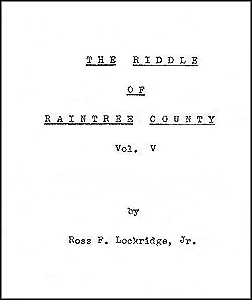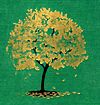
--On The Dream Section, from: SHADE OF THE RAINTREE, by Larry Lockridge. This has links to referenced selections.
--Information and selections from THE DREAM SECTION
--An Outline of "The Dream," by Ross Lockridge, Jr.
Ross Lockridge, Jr. LETTERS from Paris, 1933-4 (age 19-20):
The "idea-genesis of Raintree County"-- A brief history with transcription of letter: April 30, 1934 "I'm now installed at my new residence, 4bis Rue d'Ulm, Paris...." Facsimiles, Ap30, 1934 p. 1 (151 k) p. 2 (151 k)
Oct 8, 1933 p1, 2 - "Before I give you the latest developments along the European front . . . ."
Oct. 23, 1933 p1, 2 - "I write this letter in the gray of Paris morning . . . ."
Nov. 3, 1933 p1, 2, 3, 4, 5 - "This is going to be a huge letter . . . ."
Nov. 19, 1933 p1, 2, 3, 4 - "Work at the Sorbonne now promises to be very exacting . . . ."
Feb. 10, 1934 p1, 2, 3, 4 - "Have you felt any alarm over the exasperated condition of Paris?"
May 9, 1934 p.1, p.2: "I'm hitting mean weather just at present in my school work . . . ."
On the The Dream of the Flesh of Iron, from Shade of the Raintree, by Larry Lockridge, pp. 183-90.
--They Earn a Living, 2 pages notes facsimile (313 k)
--Those Who Sleep, 2 pages notes facsimile (352 k)
--The Pyre, notes facsimile (176 k)
--The Rains Come, notes facsimile (139 k)Selection from The Dream of the Flesh of Iron, "The Strike"--V, pp. 122-4

From Chapter Nine, "Snake Pit in Paradise" (pp. 315-8):
What
was nagging him was the fate of the 356-page Dream Section that
ended his novel, which Houghton Mifflin was urging that he drop.
Earlier he had written them portentously that the issue "is
one of great importance to me, the book, and possibly the future
of American letters; and it is one upon which I beseech no sudden
or rash decision but the most sober and careful consideration
on the part of my editors." He thinks Joyce's Walpurgisnacht
in Ulysses is "too clinical and pedantic and plain
undramatic, though it pioneers the way. Finnegans Wake, not
in any true sense a dream, is a retreat from the responsibility
of communication.... You see, all through the book my purpose
has been the opposite of Joyce's. He by his own confession attempted
to make the simple obscure, having, as he expressed it, a natural
antipathy to 'aquacity.' My whole intention is to make the obscure
simple." His own use of dream material has in any event
originated, he says, not in Joyce but in Freud.
More than a coda, the Dream Section
recapitulates the structure of the earlier novel in a new key.
We move, he says, from Myths of Origin to the Growth of Identity
to Wars of the Republic to the City of the Gilded Age to Homecoming.
"All the symbols of the book at last achieve a rich confluence
. . . We now pass through the looking glass of the map of Raintree
County, and we are in the world where for the first time in the
book, time no longer exists: the past and present (instead of
shuttling back and forth as in the Day and Flashback passages)
become simultaneous and identical." Dropping the Dream Section
would leave the narrative intact but undo one third of the novel's
conceptual apparatus.
What is the Dream Section like?
Lockridge claims new intensities here and sometimes he is right.
Reverend Jarvey's slaying of his own father, only hinted at earlier,
becomes vivid in the guilt-ridden dream. "The baptismal
font was full of the old man's clotted blood, which had gushed
in a hideous flood from his dead body.... Sooner or later the
members of the congregation would smell the stench, or someone
would go down a little too far and see the old man's stiff hand
sticking out, and the jig would be up." [1]
On one occasion Shawnessy is transformed
into a black man who is about to marry the mulatto Susanna, when
"several fat white men in ku-klux-klan robes, pig eyes through
white eyepieces, rushed him and grabbed his arms." They
lash him to the head of an iron bedstead. SECOND TYPICAL SOUTHERNER,
fat, young, friendly smile and nice teeth, high friendly voice,
'Come on, boys, le's ball this buck, and then take turns on that
little bitch. Hell, I ain't had a good black fuck for a week.'
"
The Battle of Gettysburg is fought
again by walking corpses [2], John Shawnessy
is crucified on a telegraph pole [3],
the petals of the raintree in the City turn into coins [4],
Shawnessy enters a patent office where all the world's dead bodies
are stored and classified [5],
he asks all the questions of Shakespeare one would wish answered
[6], he encounters
several eminent Victorian men who have been transformed into
women [7], and he floats
down the yellow waters of a river atop the huge old atlas of
Raintree County. [8]
The dream format invites such conceits
and transmutations, but my father is more at home with its accommodation
of farce. Shawnessy floats through his dream world, never until
the end in control of events or getting what he wants. Improving
on reality, he finds himself in bed with Nell Gaither on their
wedding night. "Give me lips, lover. Thrust home,"
she cries. Suddenly Garwood Jones appears, drunk, fully clothed,
smoking a cigar and lying squarely in the middle of the bed:
"Don't mind me, john. As best man, I'm very happy to lend
any little service I can to you and the missus. Mind if I take
a turn at the throttle?" Before Shawnessy has finished protesting,
additional uninvited guests start showing up, first the president
of the Ladies' Sitting and Sewing Society, then schoolchildren,
then a cousin from Spokane, then a committee from the Ladies'
Aid, then a delegation from the Baptist Church, then the county
school board, then Reverend Jarvey, then his father and Bobby
Burns and veterans of the Grand Army of the Republic. [9]
The homecoming sequence begins
with the Perfessor pressing a button and one by one blowing Garwood
Jones, Cash Carney, General Jacob Jackson, and finally Shawnessy
and himself off the Fourth of July speakers' platform into outer
space, where they all reassemble on a red, white, and blue rocket
and chew the fat. Down below, "some remains of cities were
visible, here and there a human hand, and now and again a wheel
or a bottle, but, as far as eye could see, no living thing."
The Perfessor says, "Frankly, I think we got off the old
ball just in time." Garwood Jones says, "Move over,
boys. Here, john, let me take a spin at the controls. Remember--I'm
still president." Shawnessy politely asks Evelina Brown
to read the minutes of the last meeting of the Waycross Literary
Society. And looking over the side of the rocket, the Perfessor
says, "You know, there's one good thing about this: It's
possible at last to be definitive about the human race. (Hawking
and spitting over side of rocket) In a word, we stank."
[10]
Elsewhere [Dream VII], at the Centennial
Exhibition, the Perfessor as barker auctions off Lockridge himself.
"Now, ladies and gents, don't go away--we've a special offer
for you today: a certain terrific professor of english--and everything
else from jesus to jinglish; back from the wars without any hurts,
after hiding behind a thousand skirts; faces the world with a
pleasant smile, absolutely devoid of guile; took first honors
and fat degree, at harvard, paris, and old pedee; juggles figures
and facts and balls, imitates barnyard animals; fast and facile
to parse and pun, jack of ten languages, master of one; converses
of cabbages, kings, and crops, lallapaloosas and lollypops; good
for thirty additional years, with quips and quotes running out
of his ears; equipped with ribbons and recommendations, a beautiful
wife and nice relations, scads of children and dissertations
on everything since god was a greek, from homer's thunder to
keats's squeak . . . Ladies and gentlemen, near and far, we're
knocking you down this shining star at--(Rapping with gavel)
Sold! For a good five-cent cigar!"
Beyond farce Lockridge can return
in dream to the time in Raintree County before there were human
beings and county lines, when the earth was shining, pregnant,
and unpolluted. [11]
Elsie can revisit the world of her early memories, denying her
father's mortality. "And now she was approaching the little
house behind its white fence. She paused with her hand on the
gate.... If now she entered, she would see them there. Her mother
would be working in the kitchen where the smell of sealing wax
lingered forever. The lost elsie and the forever lost ernest
would be in the middle room reading . . . And if she went behind
the house, she would see the sunlight falling through the apple
trees. She would see the outhouse filled with clippings, and
the barn, and the narrow backfield stretching to the railroad."
[12]
In the dream, time is a plenitude
of luminous moments that can always be repossessed instead of
a one-way tendency toward ruin. In the dream, Shawnessy finally
overcomes nostalgia as history yields to prophecy and he plants
a renewed myth of the Republic in the soil of Raintree County.
[13]
What was my father to do with all
this?.....

In December, 1945, Ross Lockridge, Jr. started the Dream Section, the finale to his novel, which had grown now to 1,650 retyped pages. --LL

The Dream Section
of Raintree County is in nine chapters or "dreams,"
and comprises the final 356 pages (volume five) of the original
2,000 page manuscript of the novel as delivered to Houghton Mifflin
in April, 1946. At the insistence of his editors, Ross Lockridge,
Jr. dropped this lengthy finale, except for a few excerpts slipped
in here and there. The 1948 first edition did not include it.
Here we present in their entirety the first and last "dreams"
(pages 1-47 and pages 306-56) of the original manuscript). Expect
other excerpts. The complete manuscript of the Dream Section
is in the Lilly Library of Indiana University.
Background reading is first highly
recommended: three pages about The Dream
Section, from: SHADE OF THE RAINTREE, by Larry Lockridge.
Included also are most of the referenced
passages from the Dream Section.
In an OUTLINE
of "The Dream", Ross Lockridge,
Jr. wrote that the entire section "presents the night dreams
of the five characters who have received special treatment during
the Day".
